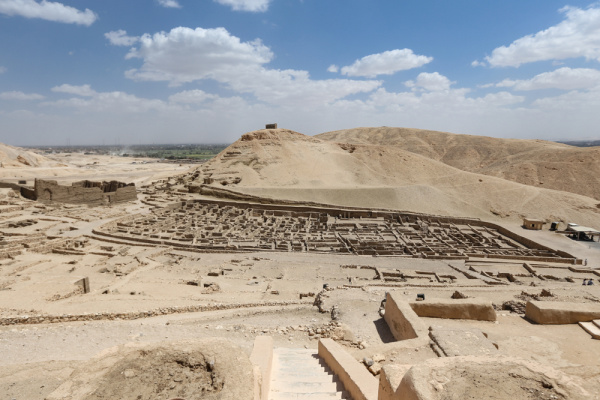Poetry Week: Love poems of Ancient Egypt
Poetry Week: Love poems of Ancient Egypt
Poetry Week: Love poems of Ancient Egypt
-
Hannah
-
Hannah

On the banks of the Nile, across from Luxor, lie the archaeological remains of Deir el-Medina. In this village lived the workmen and artisans who dug out and crafted the tombs of the Valley of the Kings during the New Kingdom period (c. 1550–1080 BC).
The site, excavated between 1922 and 1951, has being a treasure trove for scholars in terms of their learning. It affords a glimpse into a community of Ancient Egypt, showing us how people lived and worked for hundreds of years. And how they loved.

Deir el-Medina
Poems found on papyri and fragments of pottery show us that the people of Ancient Egypt were deeply passionate and romantic. It is likely that these were written by scribes, whose job was to write (few other people were literate), and that these poems were recited aloud and set to music.
Poems from papyri kept at the Chester Beatty Library and Gallery, Dublin, and dating back to around 1160 BC, paint a vivid picture of the emotional landscape of these ancient people.
She has no rival,
there is no one like her.
She is the fairest of all.
She is like a star goddess arising
… at the beginning of a new year;
brilliantly white, shining skin;
such beautiful eyes when she stares,
and sweet lips when she speaks;
she has not one phrase too many.
With a long neck and shining body
her hair of genuine lapis lazuli;
her arm more brilliant than gold;
her fingers like lotus flowers,
ample behind, tight waist,
her thighs extend her beauty,
shapely in stride
when she steps on the earth.
She has stolen my heart with her embrace,
She has made the neck of every man
turn round at the sight of her.
Whoever embraces her is happy,
he is like the head of lovers,
and she is seen going outside
like That Goddess, the One Goddess.
Such devotion! Whoever the lucky lady was, she was certainly adored. Worshipped even, perhaps. This one has a different tone:
My heart bares itself instantly,
at the memory of your love.
It does not let me walk like a person,
it has strayed from its shelter.
It does not let me put on a dress,
I cannot even wrap my scarf,
No kohl can be put no my eye,
I am not anointed with oil.
‘Don’t stand there – go in to him’
it tells me at each memory of him.
Don’t, my heart, be stupid at me:
why are you acting the fool?
Sit, be cool, the sister has come to you’
but my eye is just as troubled.
Don’t make people say of me
‘she is a woman fallen by love’
Be firm each time you remember him,
My heart, do not stray.
Such heartache in these words – and we wonder, should she open her heart?
Here we have the pain of unrequited love:
I passed by the front of his house,
and found his door was open.
Brother was standing beside his mother,
all his brothers were with him.
Love of him steals the heart of any wayfarer,
perfect youth, none like him,
choicest brother, a miracle.
He looked at me when I passed by,
but I am too alone to cry out.
How my heart races for joy,
brother, when I can see.
If only the mother knew my desire,
if she would accept it at once.
Gold Goddess, yes, put it in her heart
so I may rush to the brother,
I would kiss him in front of his staff,
I would not cry tears for anyone,
I would be happy that they realised
that you are the one who knows me,
I would make festivals for my goddess,
my heart has escaped to go out
to let brother see me in the beautiful night,
fully, in passing by.
(‘Brother’ and ‘sister’ simply indicate affection; it does not mean an actual brother-and-sister bond exists.)
What of aching for an absent love?
Seven to yesterday that I haven’t seen sister,
and sickness has entered deep into me,
I have grown heavy in my limbs,
my body has lost sense of itself.
When the chief physicians come to me,
my heart finds no relief in their remedies,
and the ritual-readers, there is no way through them,
my sickness cannot be uncovered.
Just telling me ‘here she is’ is my cure,
her name is what can raise me,
the coming and going of her messengers
is what can cure my heart.
Being a brother is better for me than any medicine:
it is more important to me than any prescription book,
My health-cure is her visit,
has she gazed, then I am well,
has she opened her eyes, then my body is young,
has she spoken, then I am strong.
When I embrace her, she has banished harm from me.
She left me now seven days.
The feeling here is so palpable, the need not just emotional but physical.
I find these ancient poems very moving, and they say so much about the human capacity for love: that it has been, and always will be, as essential to us as the air we breathe.
Sources:
https://www.ucl.ac.uk/museums-static/digitalegypt/literature/lovesongs.html
https://www.nationalgeographic.com/culture/article/ancient-egyptian-love-poems
Photo credits: 1) akimov konstantin/Shutterstock.com; 2) EvrenKalinbacak/Shutterstock.com.